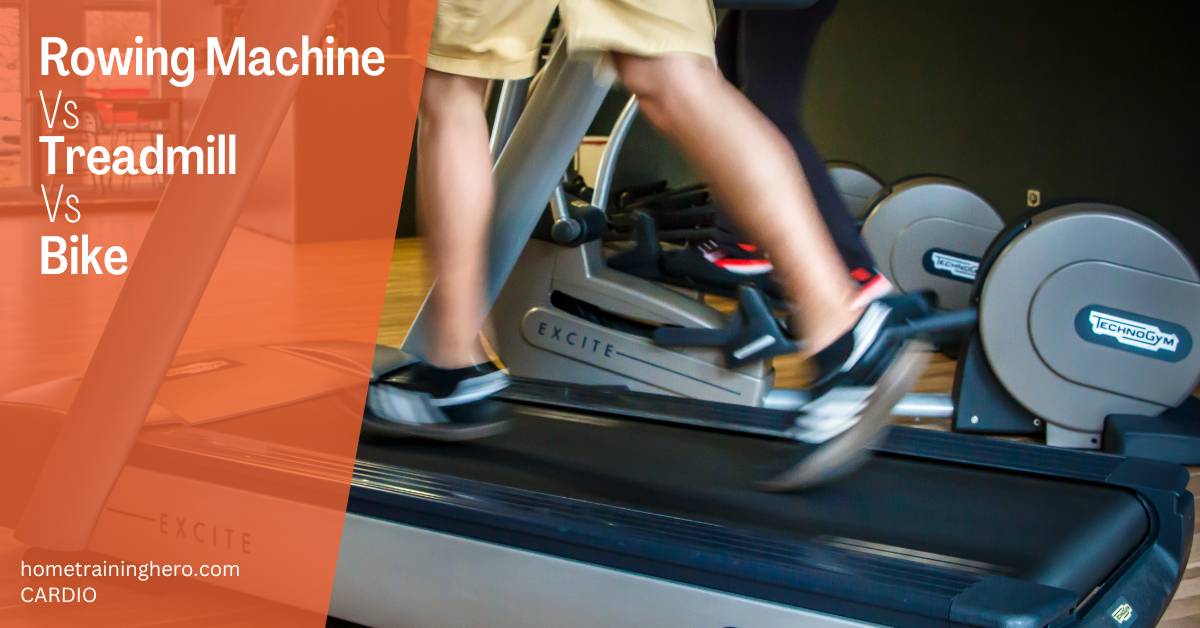Are you on the hunt for the perfect exercise equipment to help you achieve your fitness goals?
Look no further! In this article, we will delve into the world of exercise machines and compare three popular options: rowing machines, treadmills, and bikes.
Whether you’re aiming to lose weight, improve cardiovascular health, or build strength and endurance – we’ll help you make an informed decision. So, let’s jump right in and explore the features, benefits, and drawbacks of rowing machine vs treadmill vs bike!
Contents
Rowing Machine
- Choose YOSUDA: Design and produce top-quality exercise...
- 10× 10 Powerful Magnetic: Equipped with a 10-lb...
- Dual Silent System: The non-contact magnetic resistance...
The first contender in our comparison is the trusty rowing machine.
Rowing machines provide a full-body workout, engaging your arms, legs, and core muscles. Not only does rowing help burn calories and improve cardiovascular fitness, but it also helps in building muscle strength and endurance.
One of the key advantages of rowing machines is their low-impact nature. Unlike running on a treadmill or cycling on a bike, rowing puts minimal stress on your joints, making it an excellent choice for individuals with joint issues or those recovering from injuries.
Additionally, rowing machines offer adjustable resistance levels, allowing you to tailor your workout intensity to suit your fitness level.
Treadmill
- 【SPERAX QUIET MOTOR】This walking pad treadmill with...
- 【LED DISPLAY & REMOTE CONTROL】This portable...
- 【EASY TO MOVE & SPACE SAVER DESIGN】The uneder desk...
Next up, we have the classic treadmill – a staple in most gyms and homes.
Treadmills provide a convenient and efficient way to get your heart rate up and burn calories. Walking, jogging, or running on a treadmill offers a great cardiovascular workout and is effective in improving your stamina and endurance.
One of the biggest advantages of using a treadmill is its versatility. You can easily adjust the speed and incline to mimic different terrains and intensify your workout.
Furthermore, many treadmills come equipped with additional features such as heart rate monitors, built-in workout programs, and even interactive screens that allow you to participate in virtual training sessions.
Bike
- 【Bbtops Pilates Bar】- The connecting point where...
- 【Customized Pilates Bar Kit】- It comes with...
- 【All in 1-Full Body Workout 】- The workout...
Lastly, let’s pedal our way to fitness with the ever-popular exercise bike.
Whether it’s a traditional stationary bike or the modern spin bike, cycling offers a fantastic low-impact workout that is gentle on your joints while still providing an effective calorie burn. Cycling primarily targets your lower body muscles, including the quadriceps, hamstrings, and glutes.
One advantage of using a bike for your workouts is the convenience it offers. You can hop on a stationary bike even when the weather isn’t favorable, making it an excellent option for year-round training.
Additionally, many exercise bikes come equipped with adjustable resistance levels, allowing you to increase the intensity as your fitness level improves. Some models also feature interactive features that simulate cycling routes, keeping your workouts engaging and motivating.
Comparison and Considerations
Now that we’ve explored the key features of rowing machines, treadmills, and bikes, let’s delve into a detailed comparison to help you make an informed decision:
Cardiovascular Benefits
When it comes to cardiovascular benefits, all three exercise machines offer significant advantages.
Rowing machines engage more muscles compared to treadmills and bikes, making them highly efficient at burning calories and improving overall cardiovascular fitness.
However, treadmills and bikes are better suited for individuals who prefer running or cycling as their primary form of cardio exercise.
Muscle Engagement and Strength Building
Rowing machines take the lead in terms of muscle engagement, working out both the upper and lower body simultaneously.
This makes them ideal for individuals looking to build overall strength and endurance. On the other hand, treadmills primarily focus on lower body muscles, while bikes target the lower body exclusively.
If your goal is to strengthen specific muscle groups, choosing between these options will depend on your preferences.
Joint Impact and Injury Risk
If joint impact is a concern for you, rowing machines are your best bet.
The fluid motion of rowing minimizes stress on the joints, making it suitable for individuals with joint issues or those who are recovering from injuries. Treadmills can put more stress on your knees and ankles, especially if you’re running at high speeds or with poor form.
Bikes, particularly stationary bikes, offer the lowest impact on joints, making them a great choice for individuals with joint sensitivities.
Variety and Entertainment
When it comes to keeping your workouts interesting and engaging, treadmills and bikes take the lead.
Many treadmills offer built-in workout programs, interactive screens, and compatibility with fitness apps that provide virtual training experiences.
Similarly, bikes often come equipped with features like virtual cycling routes, music connectivity, and even live-streamed classes. Rowing machines, while effective, may lack the same level of entertainment options.
Space and Cost Considerations
Space availability and budget are important factors to consider when choosing exercise equipment.
Rowing machines generally take up more space due to their extended length, although some models can be folded for storage.
Treadmills come in various sizes, and foldable options are available for those with limited space.
Exercise bikes, especially upright and recumbent bikes, are generally compact and perfect for home use.
In terms of cost, rowing machines and treadmills usually fall in a similar price range, while bikes can range from affordable to high-end, depending on the type and features.
Rowing Machine vs Treadmill vs Bike: Comparison Table
| Aspect | Rowing Machine | Treadmill | Bike |
|---|---|---|---|
| Cardiovascular Benefits | Engages full body muscles for efficient calorie burn and fitness | Excellent cardiovascular workout; suitable for walking, jogging, running | Low-impact, effective calorie burn, mainly targets lower body |
| Muscle Engagement and Strength | Engages upper and lower body muscles | Primarily targets lower body muscles | Primarily targets lower body muscles |
| Joint Impact and Injury Risk | Low-impact, minimal stress on joints | Moderate impact on joints, especially at | Low-impact, minimal stress on joints |
| Variety and Entertainment | Fewer entertainment options, less variety | Built-in programs, interactive screens, virtual training | Virtual cycling routes, music connectivity, live-streamed classes |
| Space and Cost Considerations | Takes up more space, foldable options available | Various sizes, some foldable options available | Compact, suitable for home use, cost varies depending on type and features |
Final Words
Now that we have compared rowing machines, treadmills, and bikes, you have all the information you need to choose the exercise equipment that best suits your fitness goals, preferences, and lifestyle.
Remember, the key is to find a machine that not only helps you achieve your desired results but also keeps you motivated and engaged.
So whether it’s the full-body workout of a rowing machine, the convenience and versatility of a treadmill, or the low-impact cycling experience, make an informed choice and get ready to embark on your fitness journey!
Other Helpful Resources
- Does Running Increase Lung Capacity? Science and Facts About Running and How It Affects Your Lunges
- What Does Cardio Do for Your Body? The Beginner’s ABC to Cardio
- 6 Health Benefits of Jogging for 20 Minutes Every Day
- HIIT vs LISS: What is The Best Type of Cardio For me?
- My Cardio Doesn’t Work: 3 Reasons Why You Are Not Getting Results!





